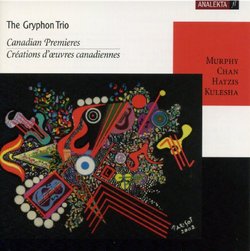| All Artists: Ka Nin Chan, Christos Hatzis, Gary Kulesha, Kelly-Marie Murphy, Gryphon Trio Title: Canadian Premieres Members Wishing: 0 Total Copies: 0 Label: Analekta Original Release Date: 1/1/2003 Re-Release Date: 4/6/2007 Genres: Pop, Classical Styles: Vocal Pop, Opera & Classical Vocal, Chamber Music, Historical Periods, Classical (c.1770-1830) Number of Discs: 1 SwapaCD Credits: 1 UPC: 774204317423 |
Search - Ka Nin Chan, Christos Hatzis, Gary Kulesha :: Canadian Premieres
 | Ka Nin Chan, Christos Hatzis, Gary Kulesha Canadian Premieres Genres: Pop, Classical
|
Larger Image |
CD Details |
CD ReviewsThree Hits and a Mess J Scott Morrison | Middlebury VT, USA | 01/06/2004 (4 out of 5 stars) "This CD contains four new works, all by Canadians, performed by what must be one of the premier piano trios in Canada, the Gryphon Trio. The only composer represented here that I'd ever heard of before is Kelly-Marie Murphy (b. 1964). She has become in the past few years one of Canada's most-played composers and with good reason. Her 'Give Me Phoenix Wings to Fly,' played here, is a 13-minute, three-movement blockbuster. Inspired by the phoenix myth, and specifically by Keats's 'But when I am consumed in this fire/Give me new Phoenix wings to fly at my desire,' and also by a few lines from Robert Graves: 'Blow on a dead man's embers/And a live flame will start,' the music does not attempt a program per se but there are plenty of flickering passages, and places where one can imagine flames erupting ferociously. Mostly, though, the piece can be enjoyed as absolute music. Murphy's rhythmic sense is unfailing invigorating, if subtle. (And it must be said that the Gryphons manage incredible ensemble with the piece's more complex cross-rhythms.) Although not recognizably tonal much of the time, there do seem to be moments of tonal centering, particularly during the piece's more restful passages. The work is notable for its continually surprising eventfulness. There is a good deal of solo work for the three musicians and each is virtuosic. I particularly gasped at the cellist's quasi-cadenza followed by a manic flight by the pianist at the beginning of III. Wow! In looking on the Internet I see that the Gryphons have played this piece all over. Huzzah to that! Now if some other piano trios would take up this piece . . .'Old Photographs,' by Christos Hatzis (b. 1953, a professor at the University of Toronto) is a piano trio extracted from a much larger multimedia work called 'Constantinople,' which is still apparently in the process of being written; it will ultimately involve mezzo-soprano, Arabic singer, violin, cello, piano, and electronic audio as well as dancers, film projections, and stage set. This piano trio, however, stands on its own and in its 10+ minutes explores in a Romantic/Impressionist/jazz idiom a nostalgia that is palpable, certainly appropriate for its name, 'Old Photographs.' It begins with a slow and serenely beautiful piano solo, eventually joined by the violin and cello, that would not be amiss in something by Bill Evans or Denny Zeitlin, but about five minutes into the piece a Piazzollan tango emerges (and so much better than other non-Latin composers' efforts I've heard recently [the limp tango in Thomas Adès's 'Powder Her Face' comes to mind]). This sultry tango will demand you look for a dance partner. And toward the end are some piano jazz licks that remind one of that earlier Torontonian composer, Oscar Peterson. An entirely likable piece, this.'Piano Trio No. 2, by Gary Kulesha (b. 1954, another composition professor at Toronto) is cast in the usual fast-slow-fast movements. Although generally tonal, there are occasional quarter-tones or bending of tones, asymmetric rhythms and some Webernian fragmentation. The overall impression is one of spontaneity, but closer inspection reveals a tight construction in the outer movements. Rhythmic vitality informs both outer movements. The first is rhythmically obsessive, as if it was trying to work its way out of a dilemma. It ends with almost inaudible piano and then strings asking an 'unanswered question.' The middle movement is rhapsodic and unapologetically melancholic. The recurrent unison passages in the third movement sound to me like a Beat poet reciting a bop epic. The whole thing ends in a exciting flurry.The only disappointment here is " and the masks evoke..." by Chan Ka Nin (b. 1949, you guessed it, he teaches at the University of Toronto). At almost 18 minutes it overstays its welcome. The pretentious program supplied by the composer goes on about 'people whose culture has been suppressed' and how the piece 'pays tribute to those who, despite the repression they have suffered, rise tranquilly over their obstacles.' That is as may be, but the music itself is, to my ears, a lot of sound effects and noodling that goes nowhere and doesn't convey much along the way. There are some electronic sounds (from a theremin?; the composer has a degree in electrical engineering, we're told) and they're actually rather interesting. And there are some momentarily interesting drumming sounds in the low piano and cello. The Gryphon Trio is a Canadian group consisting of violinist Annalee Patipatanakoon, cellist Roman Borys, and pianist Jamie Parker. They are excellent individually and as an ensemble, and sound to have really gotten into the heart of all these pieces which are, after all, being given their recording premières here. Analekta give them lifelike sound. TT=60:41Scott Morrison"
|

 Track Listings (8) - Disc #1
Track Listings (8) - Disc #1